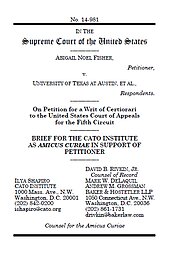Learn more about Cato’s Amicus Briefs Program.
In 2013’s Fisher v. University of Texas at Austin, the Supreme Court delivered a blow to the use of racial preferences in university admissions by reversing a lower-court opinion that had allowed the use of race in UT-Austin’s admissions policy. That wasn’t the end of the story, however; after holding that the university bears the burden of proving that its use of racial preferences is necessary and narrowly tailored—a point on which university administrators are due no deference—the Court remanded the case back to the U.S. Court of Appeals for the Fifth Circuit. That court was to determine whether UT had offered evidence sufficient to prove that its use of race was “narrowly tailored to achieving the educational benefits” of diversity. Recall that UT-Austin’s admissions program fills most of its spots through a race-neutral Top Ten Percent Plan—which offers admission to high school graduates in the top 10 percent of their class—then fills the remaining seats with a “holistic” rating that takes into account various factors typical to admissions programs (including race for certain preferred minorities). Well, on remand, the Fifth Circuit panel split 2–1 but once again sided with the university, holding that even if the Top Ten Percent Plan already provided a “critical mass” of minority students, the use of racial preferences was necessary to achieve some other special kind of diversity. The dissenting opinion by Judge Emilio Garza pointed out how the majority deferred, once again, to the university’s hand-waving claim that its use of racial preferences is tailored to an actual, appropriate interest, without having actually proven anything approaching what is constitutionally required. After being denied a rehearing before the full Fifth Circuit, Abigail Fisher, the former applicant suing UT-Austin, has now petitioned the Supreme Court to hear her case once again. And Cato has again filed a brief supporting that petition. We argue that the Court should hear the case because (1) UT-Austin’s “qualitative” diversity rationale is still a complete and unjustified sham, (2) the university continues to openly flout its disregard of Supreme Court precedent governing the use of race in higher education admissions, and (3) leaving the Fifth Circuit’s shockingly deferential and judiciously lazy ruling on the books will give other schools a roadmap for circumventing the Equal Protection Clause’s limitations on the use of race. Among other evidence we marshal is the recently discovered program of secret racial preferences run out of the university president’s office, which flouts Supreme Court precedent and belies the stated rationale of UT’s admissions policy. This is just the latest example of college administrators’ massive resistance to the Fourteenth Amendment’s charge not to discriminate based on race or ethnicity.

This work is licensed under a Creative Commons Attribution-NonCommercial-ShareAlike 4.0 International License.
